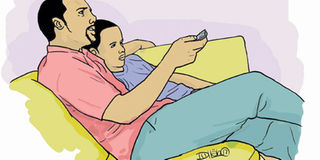PARENTING : Are they watching the right TV programmes?

What you need to know:
- “The male and female characters, I presume boyfriend and girlfriend, were having a phone conversation about love. The boy told the girl she was the girl of his dreams and that he had always liked her. The discussion did not end there as the two advanced their dialogue on meeting during the later part of the day,” Birungi says.
One Saturday afternoon in Uganda’s capital Kampala, Betty Birungi was disturbed when she walked into the living room and found her four and six-year-old daughters watching a love scene on one of the cartoon channels.
“The male and female characters, I presume boyfriend and girlfriend, were having a phone conversation about love. The boy told the girl she was the girl of his dreams and that he had always liked her. The discussion did not end there as the two advanced their dialogue on meeting during the later part of the day,” Birungi says.
On another occasion, Birungi was embarrassed when she found the girls watching a kissing scene between an action hero and a reformed female villain.
Unable to take it any longer, the mother of two restricted their viewing by blocking the inappropriate channels using the remote parental control option. “By airing such content, these TV channels are brainwashing the minds of our children and before you know it, they will begin imitating the same actions at such an early age,” she says.
Birungi is just one out of the many parents complaining of the unsuitable material airing on some of the children TV channels and hopes concerned service providers take action.
Authorities speak out
On whether Uganda Communications Commissions (UCC) was aware of the inappropriate programmes showing on the different children channels, Godfrey Mutabazi, UCC’s executive director in a brief telephone interview stated, “The complaints have been brought to our notice and we directed DStv to stop airing the programmes immediately.”
UCC, a government regulatory body of the communications sector undertakes a range of functions including licensing, research and development, consumer empowerment and policy implementation.
Meanwhile, Fr Simon Lokodo, the minister of Ethics and Integrity says he is aware of the numerous complaints from pay television subscribers.
“I was informed of the inappropriate content last month after viewers sent me personal messages urging me to do something about this,” Fr Lokodo says.
He adds, “I was forced to call up the concerned parties including Mutabazi, who responded that he would expeditiously handle the matter. I’m also aware that a committee is being setup with the aim of screening material before it is aired on television. But personally, I condemn such channels for airing inappropriate content for children as it is eroding the morals of today’s children.”
Shows banned
In an email sent to Sunday Monitor, Tina Wamala, the public relations and communications at MultiChoice Uganda mentions that some of the animated television series including The Loud House and Hey Arnold! have been removed from the Africa feed. In addition, The Legend of Korra, another animated television series has also stopped airing and has no plans of doing so in future.
“They will no longer be available on our platforms,” Wamala stated in the email.
In addition, Wamala noted that MultiChoice had contacted the channel suppliers on the various recent complaints made against Cartoon Network, Nickelodeon and Nicktoons channels with regards to their programming.
“In Africa, as in all markets, we always seek to be respectful of local laws, cultures and sensitivities and, in some instances; this means we do show amended versions of the United States (US) original series. We constantly review feedback from our audiences to ensure that this is the case and this is a responsibility that we take extremely seriously,” the email continued.
Meanwhile, Viacom International Media Networks (VIMN) Africa, comprising the world’s most popular entertainment brands including Nickelodeon revealed in an email forwarded by Wamala states, “We acknowledge the concerns expressed by customers. While we explore a variety of options, we will suspend the shows in question in Africa.
Although, Viacom International Media Networks (VIMN) Africa and Nickelodeon Africa are committed to diversity and inclusiveness, VIMN also respects the varied cultures and regulatory codes of the markets in which we operate.”
Other unregulated distributors
Despite the move by respective authorities banning particular cartoon programmes, there are still unregulated distributors selling unsuitable children video content. For instance, many of the video libraries we visited in Kampala are still selling some of the banned cartoon series on DVDs.
Some of the dealers we reached out to denied knowledge of the ban.
Brian Kakeeto, a video library owner in Kampala, went further to mention that they would not stop selling the inappropriate DVDs as the business is their source of livelihood.
“This is where I earn my living. As long as they don’t come and arrest me, I will continue selling the material whenever a client comes to ask for it,” Kakeeto says.
He makes most of the sales during holidays when children are home.




